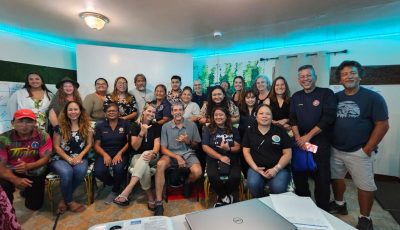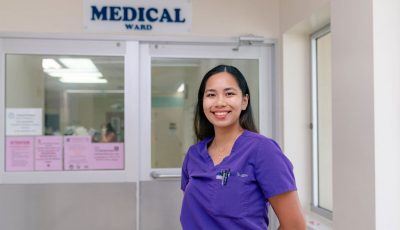CHCC on overdrive in fight vs entry of dengue virus
The Commonwealth Health Care Corp. is working double time in its dengue fever awareness campaign ever since the CNMI saw its first-ever dengue case last August.
Speaking at Tuesday’s meeting of the Rotary Club of Saipan at Hyatt Regency Saipan, CHCC Public Health medical director Dr. Phuong Luu urged the club and those on the business sector to stock up on an adequate supply of anti-mosquito products to prevent the spread of the dengue virus in the community.
Dengue is primarily transmitted through mosquito bites.
As to what the CNMI business community can do to prevent the disease, Luu described three things that can be done, the first being to provide an adequate amount of anti-mosquito products, the second is to consider creating mosquito repellent kits that supplies the vulnerable population or those who currently live in tents, and to create convenient dump sites for debris or possible breeding areas for mosquitoes.
Luu said that the biggest challenge to avoiding dengue fever is a lack of mosquito repellent, as she had conversations about this. Another concern is the weather, since it is currently the rainy season in the CNMI, which means the possibility of mosquitoes breeding is higher, as they breed in wet conditions.
Bureau of Environmental Health director John Tagabuel, who also spoke at the Rotary meeting, said that BEH is working with the Saipan Mayor’s Office and other government agencies to ensure that the dumping of typhoon debris must be in a safe area, where BEH and its partners can safely remove the debris and keep the area from becoming a mosquito breeding site.
As of Oct. 11, there have been 15 cases of dengue fever in Guam, with nine local cases and six being imported. Luu said that CHCC is making all efforts to keep the possibility of an outbreak away from the CNMI as much as possible.
Tagabuel said that the BEH has been inspecting possible vector breeding sites since September and have completed their inspections in Koblerville. He said that BEH is currently holding inspections at the Afetnas area and some parts of San Antonio.
Luu said that there are two types of mosquitoes that can transmit the disease and that only one of the two is present in the CNMI. This mosquito is known to bite in the morning hours.
If you just came from a country that has a dengue outbreak, Luu said the best time to see a doctor would be around the 14-day period after the traveler returns and if the traveler is experiencing any of the symptoms of dengue. “The two-week period is the most crucial as this is the period in which the fever can be transmitted,” Luu said.
Symptoms of dengue include sudden high fevers, severe headaches and pain behind the eyes, severe joint and muscle pain, fatigue, nausea and vomiting, and a skin rash that appears two to five days after the onset of the fever.
The CNMI has seen a total of two imported cases of the dengue fever, with the first last Aug. 8 and the second last Sept. 6. Both patients have been treated and are safe from transmitting the dengue fever.



























